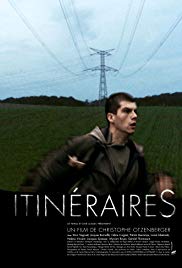
ITINERAIRES
France, 2005, 87 minutes, Colour.
Yann Tregowet, Celine Cuignet, Jacques Bonnaffe, Helene Vincent.
Directed by Christophe Otzenberger.
Itineraires is the feature debut of Christophe Otzenberger who had previously made documentaries. His skill in documentary making is evident in his re-creation of life in small towns in France, attention to detail and atmosphere.
The film focuses on a young man who has been in trouble as a youth. He becomes involved in crime
and a killing, though he is not responsible. He is imprisoned. When his grandmother dies, the grandmother who brought him up, he refuses to go to the funeral. However, when he gets out of jail, he is still followed by the police who suspect him of murder. The lieutenant, Amado, is particularly intent on making sure he is apprehended.
The film shows the life of the young man, his feelings of victimhood, his escaping to another town, being befriended by the owner of a café – another father figure instead of the father who has rejected him. It seems possible that he will have a new life, could possibly inherit the café. He also falls in love with a young woman – whose specialty is tantalising the men of the town by pretending to have vociferous sexual experiences which they all listen to. The two misfits get to know one another well – and there is a possibility of a future together. However, he is recognised in the town and the police come to get him. His dilemma is whether to succumb to police custody with the possibility of a fair trial or to escape. He feels that he will not have a chance for true justice – he is always an itinerant in this world.
The film is well acted, is modest and low key in its style – but draws the audience into the personality of the young man, his plight, his relationships and makes the audience sympathise with him and hope for justice for him.
1. The title of the film, journeys, maps, timetables – or the lack of itineraries, endless journeys?
2. North-western France, the countryside around Calais and Lille, the towns, the inhabitants and their settling in or wanting to get away? The details of the towns, apartments, bars etc? The musical score, songs?
3. The motif of Thierry, his staring at the audience – and his final fun?
4. Thierry’s grandmother, waking him up in the morning, his going to work the hard work in the fields, going out with friends, the racket and the stealing, the deliveries, his fooling around with the pigs, the man refusing to pay the money – and his colleague shooting him? His arrest?
5. The years in prison, being taken to his grandmother’s funeral, his refusing to go because he was still wearing the handcuffs?
6. Parole, the explanation of his parole, living with his parents? The lawyer Vincent Campion and his continued support? Believing in him? At home with his parents, his father and his talking about the humiliation, his drinking? His mother and her glad to have her son home? The bar, going to bring his father home? Watching the television, the confrontation with his father, burning his arm instead of his father’s? His decision to go?
7. The CB radio, his friends, interest and contact, identity, driving, the mission to find the driver, the blood, the dead man, his running?
8. His decision to give himself up, explaining the situation to the police, their discovery of his record, their not believing him? No other suspect? In the cell, Detective Amado and his interrogations? The situation, his escape?
9. On the run, hungry, going into the bar, his meeting with Gerard Fontaine, Fontaine not wanting any stories, having compassion on him, his later explanation of his marriage, his wife not wanting children, a substitute son? The hard work, the washing-up, the bond between the two men? In the streets, the men listening to Sandrine’s performance, the mother chasing them away? His return, her attraction towards him? Love, his anger on her behalf when she was insulted? The possibilities for a future? Phoning his mother, the discussions with Campion and whether he should give himself up or not? The photo in the paper and his having to go on the run again?
10. On the run, the meetings with Campion, the possibilities of giving himself up or not, their not believing him, going to jail for twenty years? His returning home, the detective in the house, his going to the cemetery, praying to his grandmother, his being advised to go?
11. The police, Amado and his detective work, keeping the case open, the friendship with Campion? His attitudes, questions, the pursuit, being in the house? Seeing the photos of Thierry as a child?
12. The other police, the judge and his severity, Amado being taken off the case, his continuing to pursue it?
13. Sandrine, at the baker’s shop, the sex performance and her leading the men on? Her mother? Her attraction towards Thierry, love for him, their time together, lyrical romance? The news, the photographer and his insult? Her being taken in for questioning by Amado? Her finally saying that she could not go on the run with Thierry?
14. The character of Fontaine, the gruff old man, kind, the father figure, the talk, Thierry helping him when drunk, the possibility of his giving his bar to Thierry?
15. The sketch of Thierry’s parents, the cruel and vicious father, the loving mother, his return and wave to her? His not having lived with them, but with his grandmother?
16. A contemporary working-class Les Miserables?